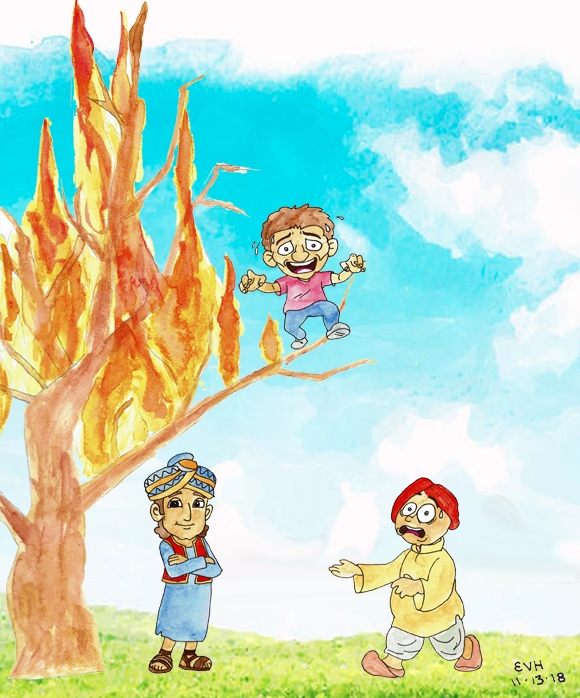
Jataka 98
Kūṭavāṇija Jātaka
The Dishonest Trader
as told by Eric Van Horn
originally translated by Robert Chalmers, B.A., of Oriel College, Oxford University
originally edited by Professor Edward Byles Cowell, Cambridge University
There is a lot of subtle humor in the Pāli Canon, and this story is a good example of that. The Bodhisatta in this story is no man with whom to trifle, as the father of the cheating merchant finds out as he scrambles to avoid being roasted!
“Wise rightly, Wisest wrongly.” This story was told by the Master while at Jetavana. It is about a cheating merchant. There were two merchants who were partners at Sāvatthi, we are told, who travelled with their merchandise and came back with their profit. The cheating merchant thought to himself, “My partner has been badly fed and badly housed for so many days that he will die of indigestion now that he is home again and can eat to his heart’s desire on rich foods. I will divide our profit into three portions, giving one to his children and keeping two for myself.” And with this plan he made an excuse day after day for delaying the distribution of the profits.
Finally realizing that it was a waste of time to try and get his money, the honest partner went to the Master at the monastery. He saluted him, and he was received kindly. “It is a very long time,” the Buddha said, “since you last came to see me.” And thereupon the merchant told the Master what had happened.
“This is not the first time, lay follower,” the Master said, “that this man has been a cheating merchant. He was a cheat in times past. As he tries to defraud you now, he also tried to defraud the wise and good of other days.” So saying, at the merchant’s request the Master told this story of the past.
Once upon a time when Brahmadatta was reigning in Benares, the Bodhisatta was born into a merchant’s family. On his naming day he was named ‘Wise.’ When he grew up he became partners with another merchant who was named ‘Wisest,’ and he traded with him.
Those two took 500 wagons of merchandise from Benares to the country districts. There they sold their wares, and then they returned with their profits to the city. When the time for dividing came, Wisest said, “I should have a double share.”
“Why?” asked Wise.
“Because while you are only named ‘Wise,’ I am named ‘Wisest.’ And Wise should only get one share to Wisest’s two.”
“But,” Wise said, “we both had an equal interest in the stock-in-trade and in the oxen and wagons. Why should you get two shares?”
“Because I am Wisest.”
And so they talked and talked until they started to quarrel.
“Ah!” Wisest thought, “I have a plan.”
He got his father to hide in a hollow tree. He told the old man that when the two merchants came that he should say, “Wisest should have a double portion.” Having arranged this, he went to the Bodhisatta and proposed to him to settle the issue of the double share by asking the Tree Sprite. He made his appeal with the words, “Lord Tree Sprite, decide our cause!” The father, who was hidden in the tree, disguised his voice, and he asked them to state their cases. The cheat addressed the tree as follows, “Lord, here stands Wise, and here stand I Wisest. We have been partners in trade. Declare what share each should receive.”
“Wise should receive one share, and Wisest two,” was the response.
Hearing this decision, the Bodhisatta resolved to find out whether it was indeed a Tree Sprite or not. So he filled the hollow trunk with straw and set fire to it. Wisest’s father was half roasted by the rising flames. He clambered up the tree by clutching hold of a limb. Falling to the ground, he uttered this stanza:
Wise rightly, Wisest wrongly got his name.
Through Wisest, I nearly roasted in the flame.

Figure: The Toast of the Town
Then the two merchants divided the profits and each took half, and at their deaths passed away to fare according to their karma.
“So you see,” the Master said, “that your partner was as great a cheat in the past as he is now.” Having ended his story, he identified the birth by saying, “The cheating merchant of today was the cheating merchant in the story, and I was the honest merchant named Wise.”
